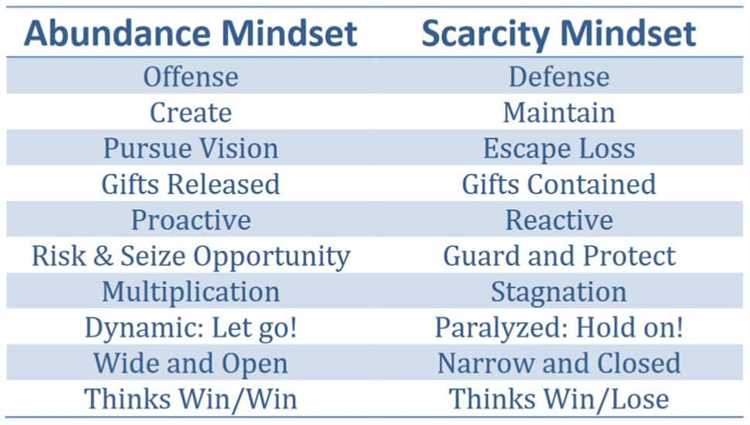Scarcity mentality is a mindset that is characterized by the belief that there is never enough. It is the belief that there is a limited amount of resources, opportunities, and success to go around, and that one must fight for their share. This mentality can have a profound impact on an individual’s life and success, affecting their thoughts, behavior, and overall well-being.
When someone has a scarcity mentality, they often approach situations with a sense of fear and anxiety. They are constantly worried about not having enough, whether it be money, time, or success. This mindset can lead to a variety of negative behaviors, such as hoarding resources, being overly competitive, and feeling resentful towards others who appear to be more successful or have more than they do.
Furthermore, scarcity mentality can hinder personal growth and development. When someone believes that there is a limited amount of opportunities available, they may be less likely to take risks or pursue their dreams. They may also struggle with feelings of unworthiness and self-doubt, believing that they don’t deserve success or abundance.
Overcoming scarcity mentality requires a shift in mindset. It involves recognizing that abundance is not finite and that there is enough to go around for everyone. This new perspective allows individuals to approach life with a sense of abundance and gratitude, which can lead to increased happiness, confidence, and overall success.
“The only thing we have to fear is fear itself.” – Franklin D. Roosevelt
By overcoming scarcity mentality, individuals can break free from the limitations they have placed on themselves and open themselves up to new opportunities and possibilities. They can cultivate a mindset of abundance and attract success into their lives. Understanding and addressing scarcity mentality is a crucial step in achieving personal and professional growth.
Definition and Explanation of Scarcity Mentality
Scarcity mentality, also known as a scarcity mindset, is a belief system that revolves around the idea that there is never enough of something. It is rooted in the fear of lack and the belief that resources, opportunities, time, and success are limited.
This mindset stems from a mindset of lack and scarcity rather than abundance and opportunity. People with a scarcity mentality tend to focus on what they lack rather than what they have, leading to feelings of deprivation and perpetual dissatisfaction.
Scarcity mentality can manifest in different areas of life:
- Money and finances: People with scarcity mentality often believe that there is never enough money, leading to a constant fear of not having enough and a reluctance to spend or invest.
- Career and opportunities: Individuals with scarcity mentality may feel that there are limited opportunities for success and growth, leading to a sense of competition and a fear of missing out.
- Time and productivity: Those with scarcity mentality may believe that there is never enough time to accomplish their goals, resulting in a constant feeling of rush and a fear of wasting time.
- Relationships: Scarcity mentality can also impact relationships, with individuals feeling a scarcity of love, trust, or attention, leading to clinginess, possessiveness, jealousy, and insecurity.
Scarcity mentality is often learned during childhood through experiences and messages that reinforce the belief in limited resources. It can be perpetuated by societal and cultural influences that emphasize competition, comparison, and the importance of acquisition.
Overcoming scarcity mentality involves shifting one’s mindset from scarcity to abundance. This can be achieved through self-reflection, gratitude practices, focusing on strengths and resources, and adopting a growth mindset that views challenges as opportunities for growth and learning.
By embracing an abundance mindset, individuals can let go of the fear and anxiety associated with scarcity mentality and open themselves up to more opportunities, happiness, and success in life.
The Negative Effects of Scarcity Mentality
Scarcity mentality, or the belief that there is a limited amount of resources, time, and opportunities, can have several negative effects on individuals. These effects include:
- Feeling of Lack: People with scarcity mentality constantly feel a sense of lack, as if they never have enough. This feeling can lead to anxiety, stress, and dissatisfaction.
- Constant Comparison: Scarcity mentality often leads individuals to compare themselves to others, focusing on what they lack in comparison to others. This can result in low self-esteem and a constant feeling of inadequacy.
- Fear of Taking Risks: Since scarcity mentality creates a mindset of limited resources, individuals with this mentality are often afraid to take risks or pursue new opportunities. They worry that they may not get another chance if they fail, which can hinder personal and professional growth.
- Hoarding and Greed: Scarcity mentality can lead to hoarding and greed, as individuals try to acquire and hold onto as much as possible for fear of running out. This can strain relationships and create a sense of isolation.
- Lack of Collaboration: People with scarcity mentality tend to be less collaborative and are often unwilling to share knowledge, resources, or opportunities. They see others as competition and believe that there is not enough to go around.
- Missed Opportunities: Scarcity mentality can blind individuals to opportunities that may be available to them. They may fail to see potential pathways for growth and success, limiting their potential in various aspects of life.
Overall, scarcity mentality can have a detrimental impact on an individual’s mental well-being, relationships, and overall success. It is important to recognize and address this mindset in order to break free from its negative effects and embrace abundance and possibility.
How Scarcity Mentality Impacts Your Life
1. Constant Fear and Anxiety: Scarcity mentality creates a constant fear and anxiety about not having enough. This fear drives individuals to constantly worry about their finances, resources, and opportunities. They are always on the lookout for potential threats and feel a sense of scarcity even when there is no real shortage.
2. Limited Perspective: People with scarcity mentality have a limited perspective on life. They focus solely on what they lack and what is missing from their lives, instead of appreciating what they have. This narrow view prevents them from seeing and seizing new opportunities and limits their ability to think creatively or take risks.
3. Self-Defeating Behaviors: Scarcity mentality often leads to self-defeating behaviors. People with this mindset may hoard resources, be overly possessive, or resist sharing with others. They may also engage in desperate actions to acquire more, even at the expense of their well-being or ethical principles.
4. Strained Relationships: Scarcity mentality can strain relationships as individuals may become competitive, possessive, or resentful towards others. They may perceive others’ success as a threat to their own well-being and feel a constant need to compare themselves to others. This can lead to jealousy, envy, and a lack of trust in relationships.
5. Missed Opportunities: Those with scarcity mentality are often unable to recognize or make the most of opportunities that come their way. Their fear and fixation on scarcity make them hesitant to take risks, try new things, or invest in themselves. As a result, they may miss out on personal growth, career advancements, and fulfilling experiences.
6. Impact on Mental Health: Scarcity mentality can have a negative impact on mental health. The constant fear and anxiety associated with scarcity can lead to stress, depression, and a feeling of being overwhelmed. It can also contribute to a pessimistic outlook on life and a lack of hope for the future.
7. Hindered Success: Ultimately, scarcity mentality hinders success. The focus on lack and limitation prevents individuals from reaching their full potential and achieving their goals. It limits their ability to think creatively, take calculated risks, and make bold moves needed for success.
8. Lack of Gratitude: Scarcity mentality often leads to a lack of gratitude. Individuals with this mindset may struggle to appreciate the abundance and blessings in their lives. Instead, they remain fixated on scarcity, which can lead to a perpetuating cycle of discontentment and dissatisfaction.
9. Financial Stress: Scarcity mentality can contribute to financial stress and instability. The constant worry and fear surrounding money can lead individuals to make poor financial decisions, live beyond their means, or avoid investing in their financial future. This can have long-term consequences for their financial well-being.
10. Limited Growth and Success: Perhaps the most significant impact of scarcity mentality is the limitation it places on personal growth and success. By focusing on scarcity, individuals are unable to tap into their full potential, develop new skills, or explore new opportunities. It becomes a self-fulfilling prophecy, perpetuating a cycle of scarcity and limiting their ability to achieve their goals.
The Link Between Scarcity Mentality and Success
Scarcity mentality refers to a mindset that is rooted in the belief that there is a limited amount of resources or opportunities available. This way of thinking can have a detrimental impact on an individual’s ability to achieve success in various areas of their life.
One of the key reasons why scarcity mentality can hinder success is because it fosters a sense of fear and competition. When individuals believe that there is not enough to go around, they are more likely to view others as potential threats to their own success. This mindset can lead to a constant state of comparison and a lack of collaboration.
Additionally, scarcity mentality can limit individuals’ willingness to take risks and explore new opportunities. When people believe that resources are scarce, they may become overly cautious and avoid taking chances that could potentially lead to growth and success. Instead, they may stick to what they know and shy away from venturing into uncharted territory.
Furthermore, scarcity mentality can also negatively impact individuals’ ability to make effective decisions. When faced with a limited amount of resources or opportunities, individuals may feel pressured to make choices quickly, without thoroughly considering all available options. This rushed decision-making process can result in suboptimal outcomes and missed opportunities for success.
On the flip side, individuals who adopt an abundance mentality are more likely to experience success. An abundance mentality is characterized by the belief that there are plenty of resources and opportunities available to everyone. This mindset fosters a sense of collaboration, curiosity, and open-mindedness.
By shifting from a scarcity mentality to an abundance mentality, individuals can unlock their potential and pursue success in a more productive and fulfilling way. This shift in mindset allows individuals to view challenges as opportunities for growth, rather than setbacks. It encourages them to seek out new possibilities, take calculated risks, and collaborate with others.
In conclusion, there is a clear link between scarcity mentality and success. By recognizing and challenging scarcity thinking patterns, individuals can overcome their limitations and embrace an abundance mentality that opens up a world of opportunities for personal and professional success.
Overcoming Scarcity Mentality: Strategies and Techniques
Scarcity mentality can have a negative impact on your life and success, but it is possible to overcome it with the right strategies and techniques. Here are some effective ways to conquer scarcity mentality:
- Start with gratitude: Cultivating a sense of gratitude for what you have can help shift your focus from scarcity to abundance. Take time each day to reflect on the things you are grateful for, whether it’s your health, relationships, or opportunities.
- Challenge limiting beliefs: Scarcity mentality often stems from limiting beliefs about yourself and your worth. Identify these beliefs and challenge them by looking for evidence to the contrary. Remind yourself of your past successes and capabilities.
- Practice abundance mindset: Adopting an abundance mindset involves believing that there is enough success, wealth, and opportunity to go around for everyone. Instead of seeing life as a zero-sum game, focus on creating win-win situations and supporting the success of others.
- Set realistic goals: Setting realistic and achievable goals can help shift your focus from what you lack to what you can accomplish. Break down your larger goals into smaller, manageable steps and celebrate each milestone along the way.
- Avoid comparisons: Comparing yourself to others only reinforces scarcity mentality. Instead of measuring your worth based on what others have or achieve, focus on your own progress and growth. Celebrate your unique strengths and talents.
- Take calculated risks: Scarcity mentality often leads to a fear of taking risks due to a fear of failure or loss. However, taking calculated risks is essential for growth and success. Identify risks that align with your goals and make informed decisions.
- Practice mindfulness: Being mindful of your thoughts and emotions can help you recognize scarcity mentality patterns and redirect them. Engage in mindfulness practices such as meditation or journaling to become more aware of your mindset.
- Surround yourself with abundance: Surrounding yourself with positive, abundance-minded individuals can help reinforce a mindset of abundance. Seek out supportive friends, mentors, or join communities that share similar values and goals.
- Give back: Practicing generosity and giving back to others can help shift your focus from scarcity to abundance. Look for ways to contribute your time, skills, or resources to make a positive impact on others’ lives.
Remember, overcoming scarcity mentality takes time and effort. By implementing these strategies and techniques consistently, you can gradually shift your mindset from scarcity to abundance, leading to greater fulfillment and success in life.
Case Studies: Examples of Scarcity Mentality in Action
Scarcity mentality refers to a mindset that is focused on lack and limitation rather than abundance and possibility. It can have a significant impact on various aspects of life, including relationships, career, and personal growth. To better understand the effects of scarcity mentality, let’s explore a few case studies:
-
John and his Fear of Missing Out (FOMO)
John constantly feels the need to be involved in every social event, fearing that if he misses out on an activity, he will be left behind or excluded. This fear stems from his scarcity mentality, which makes him believe that opportunities are scarce, and if he doesn’t seize them, he might never get another chance. As a result, John experiences high levels of stress and anxiety, constantly overcommitting himself.
-
Sarah and her Fear of Competition
Sarah is a talented artist, but she constantly compares herself to others in her field. This comparison leads her to believe that there is a limited amount of success available, and if someone else achieves it, there won’t be any left for her. Sarah’s scarcity mentality prevents her from collaborating with other artists or seeking advice and support from her peers. Instead, she isolates herself and feels threatened by anyone who shows potential.
-
Michael and his Struggles with Financial Security
Michael grew up in a household where money was scarce, and he developed a scarcity mentality when it comes to finances. Despite earning a decent income, he constantly worries about not having enough money and hoards it instead of using it wisely or investing in his future. Michael’s scarcity mentality prevents him from taking risks or exploring opportunities that could potentially improve his financial situation.
-
Laura and her Self-Worth
Laura has a scarcity mentality when it comes to her self-worth. She believes that she is not good enough and compares herself to others, constantly feeling inadequate. This mentality prevents her from pursuing her passions and fulfilling her potential. Laura’s fear of rejection and failure keeps her stuck in a cycle of self-doubt, limiting her personal growth and happiness.
These case studies illustrate the negative impact of scarcity mentality on individuals’ lives. Understanding and overcoming scarcity mentality is essential for personal growth, developing healthy relationships, and achieving success. By shifting our mindset from scarcity to abundance, we can open ourselves up to new opportunities, collaborations, and a more fulfilling life.
Questions and answers
What is scarcity mentality?
Scarcity mentality is a mindset in which an individual believes that there is never enough resources or opportunities available, leading to a fear of lack and competition.
How does scarcity mentality affect one’s life?
Scarcity mentality can have various negative impacts on one’s life. It can create unnecessary stress and anxiety, hinder decision-making abilities, and lead to a constant feeling of dissatisfaction and a focus on what one lacks rather than what they have.
What are the signs of scarcity mentality?
Some signs of scarcity mentality include constantly comparing oneself to others, excessive worry about money or resources, feeling a constant need to acquire more, difficulty in sharing or being generous, and a belief that success is limited and can only be achieved at the expense of others.
How can someone overcome scarcity mentality?
Overcoming scarcity mentality requires a shift in mindset and the adoption of an abundance mindset. This can be achieved through practicing gratitude, focusing on what one already has, reframing negative thoughts, setting realistic goals, and surrounding oneself with positive and supportive individuals.


